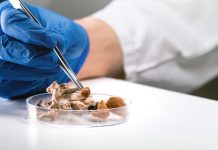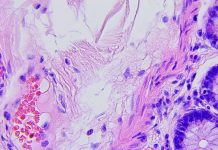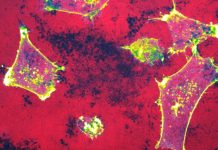A non-invasive test for the early detection of oesophageal cancer has been developed by a team of researchers at the Medical Research Council (MRC) Cancer Cell Unit and is now being rolled out across Scotland
Around 9,100 people are diagnosed with oesophageal cancer each year in the UK, and 22 patients die every day, but one of the biggest challenges when treating this form of cancer is that the early symptoms are often mistaken for heartburn, meaning that prognosis is poorer and fewer options are available to patients at an advanced stage.
However, Professor Rebecca Fitzgerald and a team of researchers at the Medical Research Council (MRC) Cancer Cell Unit have developed a simple and inexpensive test called the cytosponge.
Cytosponge
The test can detect abnormal cells in the gullet, which may indicate a person is developing Barrett’s disease (when cells in the gullet grow abnormally) or oesophageal cancer.
The cytosponge is a small round sponge contained within a dissolvable capsule and is attached to a piece of string that is swallowed with water.
The capsule dissolves in the stomach to expand into a sponge-like mesh which is 3cm wide and is then pulled back up using the string, collecting cells on the way to be analysed for any abnormalities.
Non-invasive
Unlike an endoscopy, which is usually used to diagnose Barrett’s, the cytosponge is not invasive or uncomfortable, only costs £25 and takes just 10 minutes to administer in a GP clinic without the need for a hospital visit.
In October 2020, the cytosponge was introduced in NHS Greater Glasgow and Clyde and NHS Lanarkshire in a £500,000 programme. Now, it has been announced that the device will be used across all mainland Scottish health boards.











